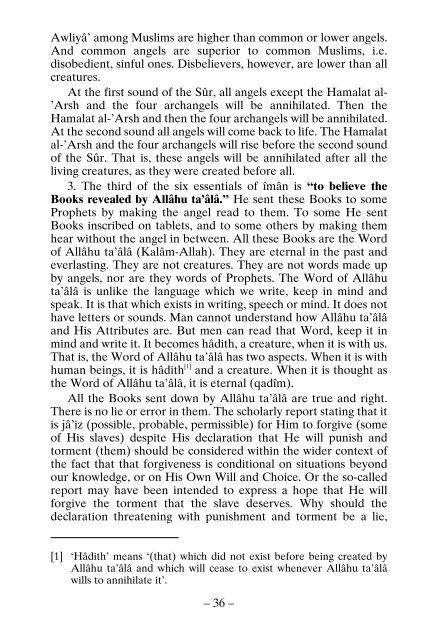Belief and Islam
BELIEF AND ISLAM star This work, Belief and Islam, originally was written in Persian under the title I’tiqâd-nâma by Hadrât Mawlânâ Khâlid al-Baghdâdî, a profound ‘âlim of Islam and a specialist in ma’ârif of tasawwuf. Hâji Faydullah Effendi of Kemah, a khalîfa of great walî Mavlânâ Mahmûd Sâhib, the brother of the author, translated the book into Turkish and named it Farâid-ul-fawâid which was printed in Istanbul in 1312 A.H.[1894]. Our bookstore had it translated again from the Persian original into Turkish and, some explanations and three chapters, published it with the title Imân ve Islâm in 1966. German, French and Arabic versions are also published by our bookstore. This book, explains five fundamentals of Islam, six fundamentals of îmân and the contemporary information about the matter and refutes those who are against Islam and those who are lâ-madbhabî.
BELIEF AND ISLAM
star This work, Belief and Islam, originally was written in Persian under the title I’tiqâd-nâma by Hadrât Mawlânâ Khâlid al-Baghdâdî, a profound ‘âlim of Islam and a specialist in ma’ârif of tasawwuf. Hâji Faydullah Effendi of Kemah, a khalîfa of great walî Mavlânâ Mahmûd Sâhib, the brother of the author, translated the book into Turkish and named it Farâid-ul-fawâid which was printed in Istanbul in 1312 A.H.[1894]. Our bookstore had it translated again from the Persian original into Turkish and, some explanations and three chapters, published it with the title Imân ve Islâm in 1966. German, French and Arabic versions are also published by our bookstore. This book, explains five fundamentals of Islam, six fundamentals of îmân and the contemporary information about the matter and refutes those who are against Islam and those who are lâ-madbhabî.
Create successful ePaper yourself
Turn your PDF publications into a flip-book with our unique Google optimized e-Paper software.
Awliyâ’ among Muslims are higher than common or lower angels.<br />
And common angels are superior to common Muslims, i.e.<br />
disobedient, sinful ones. Disbelievers, however, are lower than all<br />
creatures.<br />
At the first sound of the Sûr, all angels except the Hamalat al-<br />
’Arsh <strong>and</strong> the four archangels will be annihilated. Then the<br />
Hamalat al-’Arsh <strong>and</strong> then the four archangels will be annihilated.<br />
At the second sound all angels will come back to life. The Hamalat<br />
al-’Arsh <strong>and</strong> the four archangels will rise before the second sound<br />
of the Sûr. That is, these angels will be annihilated after all the<br />
living creatures, as they were created before all.<br />
3. The third of the six essentials of îmân is “to believe the<br />
Books revealed by Allâhu ta’âlâ.” He sent these Books to some<br />
Prophets by making the angel read to them. To some He sent<br />
Books inscribed on tablets, <strong>and</strong> to some others by making them<br />
hear without the angel in between. All these Books are the Word<br />
of Allâhu ta’âlâ (Kalâm-Allah). They are eternal in the past <strong>and</strong><br />
everlasting. They are not creatures. They are not words made up<br />
by angels, nor are they words of Prophets. The Word of Allâhu<br />
ta’âlâ is unlike the language which we write, keep in mind <strong>and</strong><br />
speak. It is that which exists in writing, speech or mind. It does not<br />
have letters or sounds. Man cannot underst<strong>and</strong> how Allâhu ta’âlâ<br />
<strong>and</strong> His Attributes are. But men can read that Word, keep it in<br />
mind <strong>and</strong> write it. It becomes hâdith, a creature, when it is with us.<br />
That is, the Word of Allâhu ta’âlâ has two aspects. When it is with<br />
human beings, it is hâdith [1] <strong>and</strong> a creature. When it is thought as<br />
the Word of Allâhu ta’âlâ, it is eternal (qadîm).<br />
All the Books sent down by Allâhu ta’âlâ are true <strong>and</strong> right.<br />
There is no lie or error in them. The scholarly report stating that it<br />
is jâ’iz (possible, probable, permissible) for Him to forgive (some<br />
of His slaves) despite His declaration that He will punish <strong>and</strong><br />
torment (them) should be considered within the wider context of<br />
the fact that that forgiveness is conditional on situations beyond<br />
our knowledge, or on His Own Will <strong>and</strong> Choice. Or the so-called<br />
report may have been intended to express a hope that He will<br />
forgive the torment that the slave deserves. Why should the<br />
declaration threatening with punishment <strong>and</strong> torment be a lie,<br />
[1] ‘Hâdith’ means ‘(that) which did not exist before being created by<br />
Allâhu ta’âlâ <strong>and</strong> which will cease to exist whenever Allâhu ta’âlâ<br />
wills to annihilate it’.<br />
– 36 –

















